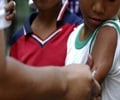Media reports indicate that India's only yellow fever vaccine manufacturing machine is malfunctioning.

The effect: to overcome its shortage, the Government of India has to bank on imports. Subsequently, the price of the vaccine in the country has shot up.
"The crucial segment of the yellow fever manufacturing unit is out of order for one and a half years. There has been no manufacturing of the vaccine at all in the institute since then," CRI officiating director S. Kutty told IANS.
He said spares for the machines are not available in India and the process is on to procure them from abroad.
Yellow fever is caused by a flavivirus transmitted by a mosquito.
Kutty said CRI Kasauli was meeting one-third of the country's total vaccine demand. "We were manufacturing 40,000 vials annually against the total demand 120,000. The rest of the demand is met through imports," he added.
Advertisement
CRI officials here said the manufacturing machine's freezer drier, a crucial part which dries the liquid form of the vaccine, has developed a major snag.
Advertisement
"There was a shortage, but the government has imported the vaccine from multinational companies like Sanofi Pasteur and the stock arrived July 11," Director General of Health Services Jagdish Prasad told IANS in Delhi.
Officials said the cost of the imported vaccine is between Rs.2,500 and Rs.3,000, whereas it is just Rs.150 for the one manufactured by CRI.
A CRI official said the institute, one of the three CRIs in the country, has been in a total mess since 2008.
He said CRI's manufacturing licence was suspended by the Drugs Controller General of India in January 2008 as it was not found in compliance with the World Health Organisation (WHO) norms for manufacturing.
However, the central government allowed the 105-year-old CRI Kasauli to restart production in 2010 after it upgraded its machinery and laboratories by spending Rs.50 crore (Rs.500 million), according to norms of WHO's Good Manufacturing Practices (GMP).
"The central government, in exercise of its powers... hereby orders revocation, with immediate effect, of the suspension of the above (manufacturing) licence," the health ministry said in its order March 2, 2010, for CRI Kasauli.
It initially allowed manufacturing of more than 15 vaccines, including DPT (diphtheria pertussis tetanus), measles, typhoid, tetanus, anti-sera and yellow fever, till Feb 28, 2013.
In March, it allowed the manufacturing facility to work till Feb 28, 2014.
The central government has no roadmap to revive the three government-run vaccine producing plants in the country, a parliamentary panel had said.
Besides CRI Kasauli, the other government vaccine manufacturing units are Pasteur Institute of India in Coonoor in Kerala and the BCG Vaccine Laboratory in Guindy, Tamil Nadu.
In its report tabled in the Lok Sabha during its monsoon session in August 2010, the panel - that included then Rajya Sabha member from Himachal Pradesh Viplove Thakur - said the sequence of events since the licences of the three units were revoked in January 2008 "clearly shows that their revival is not envisaged by the government in future".
"Every attempt was made to create hurdles so that the process of making them goods manufacturing practices compliant continues for long and their vaccine production remains suspended," the panel observed.
Source-IANS














